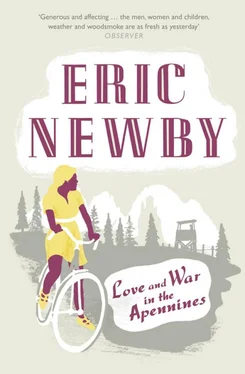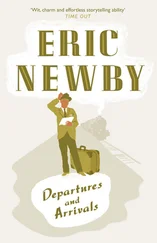‘Now go and sleep,’ he said. ‘The farmer has put some sacks in the cowshed for you.’
Then he went off, into a dark mist which had risen. It hung just above the ground so that his head and shoulders emerged above it and the lower part of his body was invisible as he walked away. It was a weird sight. The moon was sinking, shedding an unearthly reddish tinge on the misty plain. Against the dark line of the Apennines Verey lights rose at intervals. From time to time there were explosions at the foot of the hills as if dumps were being blown. On the Via Emilia the traffic roared. Altogether, it was a thoroughly macabre night.
CHAPTER FIVE Interlude in an Ospedale
The next morning, after a slow start, things began to happen with increased rapidity. It was as if a piece of an old film in which the actors emerge from vehicles, zoom into buildings with incredible speed, and miraculously appear at a window sixteen storeys up within seconds, had been interpolated in a modern one in which the characters move at a normal rate.
Around eleven o’clock an Italian doctor arrived in a Fiat 500. He was an enormous, shambling man with grizzled hair, like a bear and one of the ugliest men I had seen for a long time.
He examined my ankle, which was rather painful after the strains to which it had been subjected, raised his shoulders, made a noise which sounded like urgh and went off to have a conference with the capitano.
‘The doctor says you must go to hospital,’ the capitano said, when they emerged from their conclave.
‘But that means I shall be captured again,’ I said.
‘You’ll be taken anyway if you don’t. Apparently things are not going too well at Salerno and we’re six hundred kilometres north of it. Everything’s going to break up here, anyway. Unless you can walk you won’t stand a chance. The doctor can get you into a hospital in Fontanellato. No one will think of looking for you there.’
While he was speaking, the forerunners of an army of women, girls and small boys began to arrive at the farm on foot and on bicycles; the same girls, or the same sort of girls I had seen on the road outside the camp, except that now they were wearing their working clothes. I felt less bold now that we were at close quarters and there was no wire between us, and so did they, and all we managed were some nervous smiles.
They all carried baskets and panniers filled with civilian clothing, wine, bread, cheese, fruit, eggs and tinned food and cigarettes which they had saved from the orfanotrofio after the Germans had left and all at once the farm became a depot for the prisoners hidden behind the embankment.
I found myself a mechanic’s jacket and a pair of dark blue cotton trousers and a shirt, filled my pack with the food and cigarettes that were being pressed upon me from every side, and once again climbed the ladder to the loft where I changed into them, chucking my uniform down from the window into the yard from which it was instantly taken away.
While I was doing this I noticed a bold, good-looking girl. She was different from the others. They were all brown or black haired; but she was an ash blonde with blue eyes and she was very slim which made her seem taller than she was. She looked more like a Scandinavian than an Italian to me, but with more fire. Whatever she was she smiled at me.
Then the doctor arrived. For the last time I descended the ladder and said goodbye to the farmer and his wife who cried. They were the first people in the whole district to take the risk of helping us. Then I hopped across the yard to the Fiat.
As I was getting into it the girl came up and leant over the top of the open door.
‘I vill com to see you in the ospedale,’ she said, in fractured English. She had a deep middle-European voice. ‘Wonce I have seen you in the orfanotrofio and you vaved and the soldati went pom pom. Ve vill have lessons in languages,’ she said. ‘Your language and my language.’ And she smiled again. Then someone shut the door and we drove away.
‘If iu uont tu enter dhe steiscen iu mast haev e plaetfom tikit,’ Wanda said. ‘Se vuole entrare nella stazione deve avere un biglietto .’
I was lying in a bed in the Ospedale Peracchi on the outskirts of Fontanellato, only a few hundred yards from the orfanotrofio. I had now been free for three days. It seemed much longer. Wanda was seated on a chair which one of the suore , the nuns who were also expert nurses, had placed in a corner of the room, as far away from me as possible. Equally discreetly, the door had been left wide open. Both of us were armed with phrase books, she with a large Italian/English version, I with the English/ Italian booklet which I had salvaged on my way out of the orfanotrofio. With their help we were making heavy weather of one another’s languages, and it was not fair of her to change subjects like this.
Up to now we had been reading useful phrases to one another from the chapters on ‘Trams and Buses’. ‘Last stop. Ool ghet aut!’ ‘Kwah-lee ow-toh-bus vann-oh ah Toh-reen-oh ? Which buses go to Turin?’ I ruffled through the pages of my book which was so small that it looked as if it had been printed for a midget, until I found a section headed ‘At the Station – Alla Stazione’ , and said, ‘Oh per-soh eel mee-oh beel-yet-oh. I have lost my ticket.’ To which she replied, severely, ‘Iu haev misleid iur tikit. Iu caant continiu iur geerni anless iu ricaver it. Lei ha smarrito il suo biglietto. Non può proseguire il suo viaggio se non lo trova.’
‘Nohn vawr-ray-ee cohn-teen-u-ar loh. I don’t want to continue it,’ I said. I enunciated this, and all the other phrases, with such painstaking slowness that I sounded like a run-down gramophone.
‘Iu hev mist dhe train. È partito il treno,’ she said, triumphantly, like one of the White’s men in the orphanage putting down a natural at baccarat.
‘Grahts-ee-ay. Lay ay stah-toh jehn-tee-lay. Thank you very much. Most kind of you.’
‘Rieli nathing,’ she said, airily. ‘Ai em ounli tu glaed if ai kaen help iu. Proprio nulla, per me è un vero piacere poterla aiutare.’
She shut her book and looked at me with an air of despair which, to me, was very beautiful.
‘Hurrock,’ she said (this is what my name sounded like on her lips).
‘You will never learn italiano like this. You spik and then you forget. First you must learn la grammatica. I have learned English grammatica , so also must you learn Italian. And you must learn presto , queekly, queekly. Here, you see, I have written for you a grammatica with aggettivi, come se dice?
‘Adjectives! Adjectives! Che lingua! Also auxeiliary verbs and verbs, regolari and irregolari. You will learn all these, please, by tomorrow.’
‘I can’t learn all this by tomorrow.’
‘You vill,’ she said, ‘or I shall not kom more. I shall teach to someonels. The superiora says I can kom ven I vish. If you vont me to kom you must vork.’
She consulted her book, ‘Hueer dheers e uil dheers e ui. Proverbio. Dove c’è la volonta c’è la via.’
‘Where there’s a will there’s a way,’ I said. ‘That’s a proverb. I want you to come to see me more than anything.’
‘Then learn your grammatica,’ she said, consulting her superior phrase book. ‘Far presto! Luk slipi!’
When the doctor drove me to the hospital he made me sit next to him in the front seat. It seemed insanely risky, but the lanes through which we whizzed were as empty as the fields on either side. It was midday, mezzogiorno , and everyone, friend and foe, was under cover, eating their dinners and sheltering from the gigantic sun. Behind us a long plume of dust rose from the road and spread out across the countryside as dense as a smokescreen laid by a destroyer.
Читать дальше












